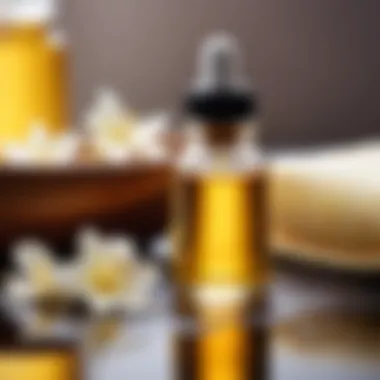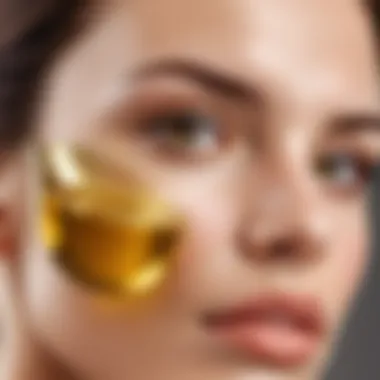Exploring the Benefits of Vanilla Oil for Facial Care


Intro
The topic of using natural oils in skincare has gained traction in recent years. Among these oils, vanilla oil stands out for its unique properties and versatility. Vanilla oil is derived from the vanilla bean, known for its rich aroma and potential benefits for the skin. Understanding how this oil can be used effectively in skincare is important for both casual users and skincare enthusiasts alike.
In this article, we will explore the various aspects of vanilla oil as it pertains to facial care. We will examine its origin, chemical properties, benefits, and potential downsides. We will also distinguish between cosmetic vanilla oil and culinary vanilla extract, which often causes confusion. As we delve deeper, engaging with both scientific literature and personal anecdotes, we aim to offer a balanced perspective on the role of vanilla oil in skincare routines.
Ürün İncelemesi
Ürün Tanıtımı
Vanilla oil, extracted from the pods of the vanilla plant, has been utilized for centuries for its fragrance and flavor. However, its application extends beyond the culinary world. This oil is rich in antioxidants, recognized for its soothing and calming properties. It is believed to contribute to skin hydration, making it a popular ingredient in various beauty products.
Ürün Özellikleri
- Natural Antioxidants: Vanilla oil contains compounds that help combat oxidative stress.
- Soothing Effect: This oil is known for its calming properties, making it suitable for sensitive skin types.
- Hydration: It assists in retaining moisture, contributing to overall skin health.
- Fragrance: The enticing aroma of vanilla adds a sensory experience to skincare routines.
"Using vanilla oil can enhance the overall experience of skincare, appealing to both the senses and skin health."
Güzellik İpuçları
Doğal Güzellik Yöntemleri
Incorporating vanilla oil into everyday skincare can be straightforward. It can be added to creams, lotions, or used directly on the skin in diluted form. Here are some methods of using vanilla oil:
- Facial Moisturizer: Add a few drops of vanilla oil to your favorite moisturizer.
- Bath Oil: Mix it with a carrier oil and add to your bath for skin hydration.
- DIY Masks: Create face masks using vanilla oil mixed with other natural ingredients.
Sağlıklı Beslenme ve Güzellik
Healthy skin also stems from proper nutrition. Foods rich in vitamins and minerals can complement the benefits of vanilla oil. Unexpectedly, vanilla can even enhance flavor in healthy meals, making nutritious choices more appealing. Balancing diet with skincare can contribute to a more effective overall beauty regimen.
In summary, vanilla oil can be a valuable addition to skincare practices. By understanding its properties and appropriate applications, users can tap into its potential benefits for facial skin. This exploration aims to clarify any misconceptions and promote informed usage.
Understanding Vanilla Oil
Understanding vanilla oil is crucial for appreciating its potential benefits for facial skin. This section delves into its definition, origin, and how it is extracted, providing context to its application in skincare.
Definition and Origin
Vanilla oil, derived from the pods of the vanilla orchid, is a fragrant oil that has gained popularity for both culinary and cosmetic uses. The most commonly used species for oil extraction is Vanilla planifolia. This orchid is native to regions like Mexico and parts of Central America. The plant requires specific climatic conditions to thrive, typically warm temperatures and significant humidity. Historically, vanilla has been treasured for its unique scent and flavor, making it a sought-after ingredient in various products.
The oil is known not just for its aromatic properties but also for its potential therapeutic effects. It is often lauded as a natural tool for skincare, attracting interest from those looking for holistic beauty solutions.
Extraction Methods
The extraction of vanilla oil can be done through several methods, each influencing the quality and properties of the final product. The most traditional method is solvent extraction, where a solvent like ethanol is used to draw out the oil from the vanilla pods. This method is effective but can sometimes leave residual solvent in the oil, making it crucial to choose products from reputable sources.
Another common method is steam distillation. In this process, steam is passed through vanilla pods, extracting the essential oils without the use of chemicals. This typically results in a purer product, favored for cosmetic applications.
Some products available in the market might combine both processes to create a balanced oil that retains the essence of vanilla while ensuring higher purity. It is beneficial for consumers to be aware of these methods when selecting vanilla oil for facial use. This knowledge not only enhances the efficacy of the oil but also ensures safety in application.
Composition of Vanilla Oil
Understanding the composition of vanilla oil is crucial for appreciating its role in skincare. The constituents of vanilla oil do not just identify its aromatic qualities; they also determine its effectiveness in relation to skin health. Knowledge of the composition allows users to make informed choices about incorporating it into their routines. Here, we delve into the key components and therapeutic properties that contribute to the utility of vanilla oil.
Key Components
Vanilla oil is composed of various elements that have implications for skin benefits. The primary component of vanilla oil is vanillin, which is responsible for the characteristic scent. Aside from vanillin, other significant ingredients include essential fatty acids, antioxidants, and traces of phenolic compounds. These components work synergistically to provide several benefits:
- Moisturization: Essential fatty acids in vanilla oil help to retain moisture in the skin, preventing dryness.
- Antioxidation: Compounds like vanillin offer antioxidant properties, which can neutralize free radicals.
- Anti-inflammatory effects: Certain components possess anti-inflammatory characteristics, making them useful for calming irritation.


This combination supports the skin’s barrier and overall wellness. Understanding these components aids in recognizing how vanilla oil can enhance one's skincare regimen.
Therapeutic Properties
The therapeutic properties attributed to vanilla oil are noteworthy. With its notable ingredients, vanilla oil serves multiple purposes in skincare. Some of the key therapeutic properties include:
- Antioxidant action: The presence of antioxidants helps combat oxidative stress, which can lead to premature aging. The vanillin content also contributes to this protective element.
- Mood elevation: The scent of vanilla oil has been studied for its ability to affect mood positively. Aromatherapy applications often cite scent as a means to reduce anxiety and evoke feelings of calm.
- Skin soothing: Many users discover that vanilla oil can soothe minor skin irritations or redness due to its gentle properties. This makes it a suitable addition for various skin types.
"The rich constituent elements of vanilla oil can offer more than just fragrance; they harbor therapeutic power that benefits the skin and overall mental well-being."
As a holistic approach to skincare gains traction, understanding the composition of vanilla oil becomes increasingly relevant. Knowing its components and therapeutic properties can provide a gateway to a more effective skincare routine.
Benefits of Using Vanilla Oil on the Face
Vanilla oil is not just a flavorful addition to desserts; it offers several advantages when applied to the skin, particularly on the face. Understanding the benefits of vanilla oil is crucial for those exploring its potential within skincare routines. The unique properties of this oil can contribute to skin health in various ways. Here we will delve into three significant benefits: moisturizing effects, antioxidant properties, and scent and mood enhancement.
Moisturizing Effects
One of the primary benefits of using vanilla oil is its ability to moisturize the skin. This oil possesses emollient properties, which means that it can help to soften and smooth the skin's surface. For individuals with dry or dehydrated skin, applying vanilla oil may provide a protective barrier that locks in moisture. Importantly, this could lead to a reduction in the appearance of fine lines and dryness. The oil can be used alone or mixed with other carrier oils such as jojoba or coconut oil to enhance its moisturizing effects.
"Moisturized skin is healthier skin."
This quote emphasizes the essential role that proper hydration plays in maintaining overall skin health.
Antioxidant Properties
Antioxidants are vital in skincare as they combat oxidative stress caused by free radicals. Vanilla oil contains compounds that exhibit antioxidant characteristics. These substances help protect the skin from damage due to environmental factors, such as pollution and UV radiation. By incorporating vanilla oil into a skincare regimen, individuals may experience improvements in their skin's overall tone and texture. Regular use could potentially lead to a more youthful appearance, making it an appealing option for those who are proactive about their skincare.
Scent and Mood Enhancement
The aroma of vanilla is often linked to positive feelings and relaxation. Utilizing vanilla oil not only benefits the skin but also enhances the overall sensory experience. When applied as part of a skincare routine, the scent may promote a sense of calm and comfort. This psychological benefit is essential in today's fast-paced world, where stress can take a toll on both mental health and skin condition. Incorporating vanilla oil can be a simple yet effective way to improve mood while also nourishing the skin.
Comparing Culinary and Cosmetic Vanilla Oil
The distinction between culinary and cosmetic vanilla oil is crucial within the context of skincare applications. While both types are derived from the vanilla orchid, they serve vastly different purposes and possess unique properties that affect their use on the skin.
Differences in Composition
Culinary vanilla oil and cosmetic vanilla oil differ significantly in their chemical composition. Culinary vanilla, often made from vanilla beans, contains compounds such as vanillin, which provides flavor. This oil can sometimes include alcohol if it's processed as an extract. The concentration of these flavor compounds makes it suitable for food, but not necessarily for skin application.
In contrast, cosmetic vanilla oil is usually made through more refined extraction methods, leading to higher purity and different chemical makeup. This type may include additional blends with carrier oils suited for skin absorption. The absence of certain alcohol contents makes cosmetic vanilla oil less irritating for facial application.
Application in Skincare
Understanding the application of culinary versus cosmetic vanilla oil is essential for safety and efficacy. Culinary oils could deliver a pleasant scent but may cause skin irritation due to their higher concentration of substances not meant for skin. Using culinary oil might not provide the same soothing or nourishing benefits that can be achieved with cosmetic formulations.
On the other hand, cosmetic vanilla oil can be integrated into skincare routines effectively. Here are a few common applications:
- Moisturizers: When added to creams or lotions, it can enhance hydration and add a comforting scent.
- Facial Oils: It serves as a great base for serums, especially when diluted with carrier oils like jojoba or argan oil.
- Aromatic Treatments: Its scent makes it popular in aromatherapy, promoting relaxation and mood improvement.
When choosing between these two types, it is important to select cosmetic vanilla oil for facial use to avoid adverse effects. Proper knowledge of their distinct compositions and uses can guide one towards a safer and more beneficial skincare regime.
How to Use Vanilla Oil on the Face
Using vanilla oil on the face requires careful consideration and knowledge. Understanding the right way to apply it can enhance its benefits while minimizing risks. This section looks into practical aspects of using vanilla oil, including how to dilute it properly and how to integrate it into skincare routines.
Recommended Dilution
Dilution is crucial when using essential oils to prevent skin irritation. Vanilla oil, being an essential oil, is potent and concentrated. A common recommendation is to dilute vanilla oil with a carrier oil. Examples of carrier oils include jojoba oil, sweet almond oil, or coconut oil.
For facial use, a dilution ratio of 1:4 is often ideal. This means combining one part of vanilla oil with four parts of carrier oil. Since individual skin types vary, it is beneficial to start with a lower concentration and observe how the skin reacts.
- Mixing Tips:


- Use a dark glass bottle to store the mixture, as this helps preserve the oil's integrity.
- Always perform a patch test on a small area of skin to ensure there are no adverse reactions.
Inclusion in Skincare Routines
Incorporating vanilla oil into existing skincare routines can provide additional benefits. Here are some effective ways to include it:
- Moisturizer Synergy:
- Facial Serums:
- Facial Masks:
- Evening Ritual:
- Add a few drops of diluted vanilla oil to face creams or lotions for an enhanced moisturizing effect.
- Blend it into serums for targeted treatment, particularly for mature skin, which may benefit from its antioxidant properties.
- Use the diluted oil in homemade masks for added fragrance and hydration.
- Include it in nightly routines. The scent can promote relaxation, potentially improving sleep.
Consistency is key. Regular use in moderation can lead to improved skin texture and appearance over time.
By following these guidelines, individuals can safely and effectively incorporate vanilla oil into their skincare practices.
Potential Drawbacks
Though vanilla oil offers several beneficial properties for skin care, it is essential to explore its potential drawbacks. Understanding these limitations can prevent adverse reactions and ensures a safe integration of vanilla oil into one’s skincare routine. By discussing allergic reactions and skin sensitivity, we can equip readers with the knowledge to use vanilla oil wisely.
Allergic Reactions
Allergies to vanilla oil are possible, although they are not commonly reported. Individuals with sensitivities to vanilla or other fragrance compounds may experience allergic responses. Symptoms can vary from mild to severe and may include redness, swelling, itching, or even hives. It is crucial to conduct a patch test before applying vanilla oil extensively on the face.
To perform a patch test, apply a diluted amount of vanilla oil on a small area of skin, such as the wrist or behind the ear. Wait for 24 hours to monitor any reactions. This small step could prevent more significant issues and secure a safe skin care experience.
Skin Sensitivity Considerations
Skin sensitivity is another crucial aspect to consider when using vanilla oil. Those with sensitive skin types might find that even diluted essential oils can cause irritation. Factors such as skin conditions (like eczema or psoriasis), extreme weather, or hormonal changes could exacerbate sensitivity issues.
It is advisable to observe how the skin reacts to new products, particularly those with active ingredients or strong fragrances. If irritation occurs, it is wise to discontinue use immediately and consult a dermatologist.
Some tips for mitigating sensitivity include:
- Dilution: Always use a carrier oil to dilute vanilla oil. This reduces the potency and lowers the risk of irritation.
- Avoid Sun Exposure: Essential oils can make the skin more photosensitive. Try to avoid sun exposure after applying vanilla oil.
- Use Sparingly: Limit the frequency of application to gauge how the skin adapts over time.
"Awareness of potential drawbacks is vital to achieving desired skincare results without negative repercussions."
Research and Evidence
Research and evidence play a pivotal role in understanding the uses and benefits of vanilla oil on facial skin. In a landscape where products are often marketed without adequate scrutiny, scrutinizing scientific studies and anecdotal reports provides clarity. This section aims to bridge the gap between anecdotal experience and empirical research, offering a comprehensive perspective on the effectiveness of vanilla oil.
Existing Studies on Vanilla Oil
Scientific studies on vanilla oil are limited, yet they hold significant importance in establishing credibility. Some research highlights the presence of compounds in vanilla oil that exhibit antioxidant and anti-inflammatory properties. These compounds may contribute to improved skin health, particularly for individuals with dry or sensitive skin.
Surveying existing studies, one can find that the vanillin compound, the primary component of vanilla oil, is noted for its ability to combat oxidative stress. Oxidative stress is known to deteriorate skin quality, leading to issues such as premature aging. The potential of vanilla oil in skin care, while not exhaustively covered in academic literature, indicates a promising angle for further research.
Moreover, a few studies have suggested that topical application of vanilla extract or its derivatives may have protective effects when exposed to UV light. However, these studies often recommend more exploration to understand the extent of such benefits.
Anecdotal Evidence from Users
Anecdotal evidence offers insights into personal experiences with vanilla oil, complementing the scientific findings. Social media platforms and forums frequently feature testimonials from users who have integrated vanilla oil into their skincare routines. Many users report improvements in skin texture and hydration after applying vanilla oil. Common claims include:
- Enhanced moisturization leading to softer skin.
- Positive effects on fragrance, promoting a calming atmosphere during skincare rituals.
- Reports of reduced redness and irritation, particularly for sensitive skin types.
While personal testimonials can provide valuable perspectives, they should not substitute for scientific proof. Nonetheless, the volume of anecdotal evidence surrounding vanilla oil highlights its growing popularity within various demographics, including both men and women. Some individuals even combine vanilla oil with other natural oils to create personalized skincare blends, further showcasing its versatility.


In summary, both empirical studies and anecdotal user experiences form a dual narrative that enriches our understanding of vanilla oil's place in skincare. Though existing studies are not exhaustive, they underline the need for continued investigation. Personal testimonies add a layer of relatability, suggesting that vanilla oil may be worth considering for those seeking natural skincare options.
Professional Opinions
Understanding the perspective of professionals in the field is crucial when discussing the use of vanilla oil on the face. The insights shared by dermatologists and cosmetic chemists provide valuable context for potential users. These experts base their opinions on a combination of scientific knowledge, practical experience, and ongoing research. By considering their viewpoints, individuals can make informed decisions regarding the incorporation of vanilla oil into their skincare routines.
One important element to note is the emphasis on safety. Professional opinions often guide consumers towards safe practices. This includes understanding appropriate dosages and potential allergies. Furthermore, such insights help in comparing vanilla oil to other skincare ingredients, noting both advantages and disadvantages.
These expert evaluations serve as a vital resource for anyone pondering whether to adopt vanilla oil as part of their facial care regimen.
Insights from Dermatologists
Dermatologists play a pivotal role in education regarding skincare products. They have a comprehensive understanding of skin health and can assess the efficacies and risks associated with vanilla oil use.
Many dermatologists advocate for the moisture-retentive properties of vanilla oil. They note its ability to keep skin hydrated, which is essential for maintaining a youthful appearance. However, they also caution about its application on sensitive skin types. Some doctors recommend conducting a patch test before extensive use, as individuals might react differently to the oil.
Additionally, dermatologists highlight the antioxidant characteristics of vanilla oil, which can combat oxidative stress. This is particularly relevant in today’s urban environments, where air pollution can damage skin. Incorporating expert advice helps to underline the importance of context when using any new skincare product.
Cosmetic Chemists' Viewpoint
Cosmetic chemists focus on the formulation and function of skincare products, and their insights provide significant depth to the discussion on vanilla oil. They analyze the chemical structure of vanilla oil and how it interacts with other ingredients. According to them, the oil possesses unique compounds that contribute to its soothing properties, making it favorable for calming irritated skin.
When discussing the use of vanilla oil in formulations, chemists often emphasize its potential as a fragrance component. However, they advise caution regarding the source of the oil. The distinction between natural and synthetic vanilla is vital—synthetic variants might offer different benefits and safety profiles.
Furthermore, cosmetic chemists advocate for personalized skincare. This implies that vanilla oil may not work the same for everyone, and it should be tailored to fit individual skin types and conditions. In sum, the insights from cosmetic chemists can help consumers navigate the complex world of skincare ingredients.
Alternatives to Vanilla Oil
Exploring alternatives to vanilla oil is crucial for individuals seeking to enhance their skincare routine. While vanilla oil has its benefits, other options exist that may offer similar or superior effects. This section discusses natural oils and artificial fragrance alternatives that can complement or substitute vanilla oil in various skincare applications.
Other Natural Oils
Natural oils serve as an excellent option for skincare, often providing a wide range of benefits. Some popular natural oils include:
- Argan Oil: Rich in vitamin E and fatty acids, argan oil can help hydrate and nourish the skin, making it a sought-after choice for moisturizing.
- Jojoba Oil: Jojoba oil closely resembles human sebum. It helps regulate oil production and is beneficial for those with oily or combination skin types.
- Rosehip Oil: Known for its regenerative properties, rosehip oil is high in essential fatty acids and antioxidants, perfect for improving skin texture and reducing scars.
- Tea Tree Oil: With its antibacterial properties, tea tree oil is effective for acne-prone skin. It can help reduce inflammation and promote healing.
These options not only provide hydration but also bring specific benefits depending on the user’s skin needs.
Artificial Fragrance Options
Some prefer artificial fragrances for their consistency and strength. These options are formulated to deliver a lasting scent with less potential for skin irritation compared to some natural oils. When considering artificial fragrance choices, the following merits come into focus:
- Synthetics Production: Artificial fragrances can be manufactured to avoid allergens commonly found in natural oils.
- Cost-Effectiveness: Often, artificial fragrances can be more affordable than high-quality essential oils, making them accessible for various budgets.
- Variety: The range of scents available in artificial fragrances can cater to differing consumer preferences, which can enhance the overall experience of use.
However, users should be cautious, as some may still experience sensitivity to certain synthetic ingredients.
Choosing the right oil, whether natural or synthetic, is essential. Each oil can provide unique properties that suit individual skin types and preferences.
In summary, considering alternatives to vanilla oil broadens the options for skincare enthusiasts. Individuals can tailor their choices based on specific needs, skin type, and scent preference.
The End
The conclusion serves as the final articulation of various facets of using vanilla oil on the face. It consolidates the insights presented throughout this article, allowing readers to gain a clear perspective on the relevance and implications of incorporating this oil into their skincare routines.
Final Thoughts on Vanilla Oil Usage
Vanilla oil is not just a pleasant aroma; it offers various potential benefits for facial skin care. Its moisturizing properties can help to hydrate and nourish the skin. Moreover, with its antioxidant effects, it may provide protection against environmental stressors that accelerate skin aging. The mood-enhancing qualities of vanilla aroma can also augment the overall skincare experience.
However, it is important to remain cautious. Not everyone may tolerate this oil well. Allergic reactions or skin sensitivities can occur. Therefore, conducting a patch test prior to full application is recommended to identify any adverse reaction. If irritation arises, it is best to discontinue use.
The differentiation between culinary and cosmetic vanilla oil remains key to understanding its application. While culinary vanilla is suited for flavoring food, cosmetic vanilla oil is tailored for skincare, with specific purity standards. Thus, knowing the right type of product is crucial.
Ultimately, the decision to use vanilla oil in your skincare regimen should be informed by personal preferences and skin responses. For those seeking natural options with delightful scents, vanilla oil might be a worthwhile addition. As with any skincare product, individual research is vital.
"Knowledge of the product can elevate not just usage but also result satisfaction."
In summary, vanilla oil stands as an appealing option for skin care, provided that one remains mindful of its properties and personal skin needs.







